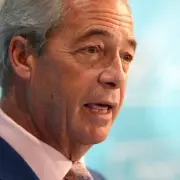Entertainment
Adidas and Simone Rocha Unveil Sporty Collaboration at London Fashion Week
Simone Rocha's autumn/winter 2026 collection at London Fashion Week featured a high-profile collaboration with Adidas, blending sportswear with feminine details like lace and ribbons.
Sports
Barry Hearn Slams Conor Benn's 'Outrageous' Exit from Matchroom Sport
Boxer Conor Benn has left Matchroom Sport after a decade, with founder Barry Hearn calling it the 'bitterest' departure in his 50-year career.
Politics
Mugabe's Son Faces Attempted Murder Charges in South African Court
Bellarmine Chatunga Mugabe, son of Zimbabwe's late former President Robert Mugabe, appears in court on attempted murder charges following a shooting at his Johannesburg home.
Crime
London Parents Face Murder Charges Over Death of Three-Month-Old Son
A mother and father in North Finchley have been charged with murder after their three-month-old son died from significant injuries, following an emergency call in January.
Business
Health
Weather
NYC Mayor Declares Emergency and Travel Ban for Blizzard
New York City Mayor Zohran Mamdani has declared a local state of emergency and issued a travel ban as the city prepares for its first dangerous blizzard in over a decade, with up to 24 inches of snow forecast.
NYC Mayor Declares Emergency and Implements Travel Ban
New York City Mayor Zohran Mamdani has declared a local state of emergency and ordered a travel ban as the city prepares for its worst blizzard in over a decade, with schools closed and non-essential vehicles restricted.
Thailand Hit by 6.5 Magnitude Earthquake After Borneo Quake
A significant magnitude 6.5 earthquake has struck Thailand, as reported by the German Research Centre for Geosciences. This seismic event follows a magnitude 6.8 quake in Borneo, highlighting regional tectonic activity.
US Northeast Braces for Blizzard with Heavy Snow and High Winds
A severe winter storm is hitting the US Northeast, with blizzard warnings from Maryland to Massachusetts, over 6,000 flights cancelled, and residents urged to stay indoors.
East Coast Blizzard: 12,000 Flights Delayed, 18 Inches Snow Forecast
A severe nor'easter batters the East Coast, causing massive flight cancellations and delays while forecasters predict up to 18 inches of snow and dangerous blizzard conditions across multiple states.
Tech
Get Updates
Subscribe to our newsletter to receive the latest updates in your inbox!
We hate spammers and never send spam
Environment
UK Geography Quiz: Test Your Knowledge
Challenge yourself with 100 multiple-choice questions about the geography of the United Kingdom. Perfect for students, travelers, and geography enthusiasts.











































